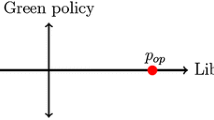Abstract
An assumption of sincere voting for one's most preferred candidate is frequently invoked in models of electoral competition in which the elected legislature consists of more than a single candidate or party. Similarly, such an assumption is more-or-less implicit in many normative discussions of the relative merits of alternative methods for electing a representative assembly. Voters, however, have preferences over policy outcomes—which are determined by the ex post elected legislature—and not over candidates per se. This paper examines the extent to which the sincere voting assumption is legitimate in a wide class of strategic models of legislative elections. The finding is negative, and this has direct implications for the interpretation of conlusions drawn from models—formal or otherwise—which impose sincere voting as an assumption.
Similar content being viewed by others
References
Austen-Smith D, Banks J (1988) Elections, coalitions and legislative outcomes. Am Polit Sci Rev 82:405–422
Baron D, Ferejohn J (1987) Bargaining in legislatures. GSB, Stanford (Typerscript)
Border K, Jordan J (1983) Straightforward elections, unanimity and phantom voters. Rev Econ Stud 50:153–170
Cox G (1985) Electoral equilibrium under approval voting. Am J Polit Sci 29:112–118
Cox G (1987) Electoral equilibrium under alternative voting institutions. Am J Polit Sci 30:82–108
Downs A (1957) An economic theory of democracy. Harper & Row, New York
Greenberg J, Shepsle K (1987) The effect of electoral rewards in multiparty competition with entry. Am Polit Sci Rev 81:525–538
Greenberg J, Weber S (1985) Multiparty equilibria under proportional representation. Am Polit Sci Rev 79:693–703
Mill JS (1861) Considerations on representative government. London
Moulin H (1980) On strategy-proofness and single peakedness. Public Choice 35:437–455
Palfrey T (1986) Comments. Public Choice 50:211–219
Riker W (1982) The two-party system and Duverger's Law: an essay on the history of political science. Am Polit Sci Rev 76:753–766
Sugden R (1984) Free association and the theory of proportional representation. Am Polit Sci Rev 78:31–43
Ursprung H (1980) Voting behaviour in a system of concordant democracy. Public Choice 35: 349–362
Author information
Authors and Affiliations
Additional information
This paper is a revised version of CalTech Social Science Working Paper #637, and was written while I was a National Fellow at the Hoover Institution, Stanford University. Much of the paper is a result of the efforts of John Ledyard to understand what I was trying to say about the problem. I am extremely grateful for his help, and for his insistence that I look for a theorem and not simply a set of examples. I am also grateful to Kim Border for providing the structure of a proof for one of the results. Despite their imput, I retain all responsibility for any remaining errors and ambiguities.
Rights and permissions
About this article
Cite this article
Austen-Smith, D. Sincere voting in models of legislative elections. Soc Choice Welfare 6, 287–299 (1989). https://doi.org/10.1007/BF00446986
Received:
Accepted:
Issue Date:
DOI: https://doi.org/10.1007/BF00446986




